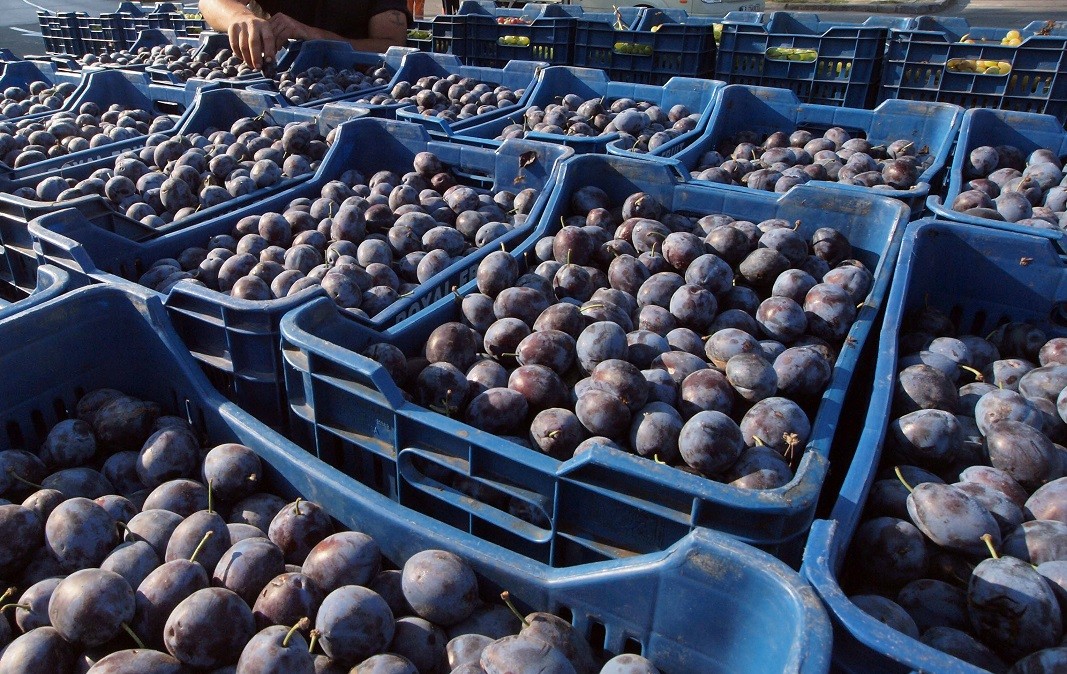Farmers from the region of Kyustendil (Southwestern Bulgaria) gathered a very good harvest of plums. 80% of the plums grown there are of the early Stanley variety, and the harvesting of the later varieties was completed in September. About 2.5 tonnes per hectare is the harvest, which is considered excellent for the area, say agronomists from the Institute of Agriculture in Kyustendil. Of course, this is a reason for joy and pride for the farmers, who have invested a lot of care in growing the fruit trees, but the large quantities also give rise to many worries about finding the necessary markets for them.
"Besides yields, the question is also what price the farmers achieved for their production. The harvest of plums not only in Kyustendil, but also in Blagoevgrad is extremely good," says Associate Professor Dr. Dimitar Sotirov, deputy director of the Institute of Agriculture, in an interview with BNR’s Radio Blagoevgrad.
"It is normal with this abundance of production that the price falls. The problem with plums is that there is not enough processing capacity. There are some facilities for dried produce, but they are extremely insufficient and people have nowhere to sell their produce, so a large part of it goes for processing into alcoholic beverages. In this case, the price is not good and starts with 50-60 stotinki per kilo, but very quickly drops to 30 cents, sold for brandy. Farmers cannot be satisfied with this purchase price, as preparations and fertilizers have increased their price up to two times, but the abundant harvest somewhat compensates for these high prices. Much more is left to be desired for farmers to cover their costs.”

And while the plum harvest will still reach consumers in a different form, the problem with the rich pear harvest is even greater. Pears in the region ripen literally everywhere - from well-tended plantations in the region of Kyustendil, to abandoned gardens and even in mountain villages, where even wild pears are laden with fruit. However, there is no market for them anywhere, and this is also the concern of the agro-specialist:
"The market is flooded with fruit, and the problem is more difficult than with plums and apples. Very few pears are taken by some production facilities for processing into juices. Otherwise, we all know that when juice is made from apples and pears, it becomes much nicer in taste and richer in minerals. Another problem is that there are no cold rooms where the production can be stored and can be sold for a longer period of time."
Unlike previous years, there is now no demand from fruit buyers - traders and processors. "In general, in recent years, the interest in exporting pears, apples and plums has been very weak", says Assoc. Prof. Dimitar Sotirov. He did not comment on whether such fruits are exported abroad, because there is no information about this. However, the problem remains and it is that a large part of the harvested produce will not reach the consumer. Some will be processed into juices and spirits, a tiny fraction will go to fresh consumption, but a large amount will most likely go to waste.
Compiled by Gergana Mancheva
Editing by Elena Karkalanova
Photos: BGNES - libraryThe Gross Domestic Product has gone up by 2.4% during the third quarter of the year compared to the same period of 2023, indicate preliminary National Statistical Institute data. This indicates there is a certain acceleration of the growth..
A year with good results in the banking sector, achieved in a difficult domestic and external environment. This is how the governor of the Bulgarian National Bank (BNB), Dimitar Radev, assessed the outgoing 2024 in an interview with..
Bulgaria and Romania will be fully admitted to the Schengen area, said Walter Ruck, President of the Vienna Chamber of Commerce and Industry said during a meeting with Bulgarian Vice President Iliana Iotova in Vienna. Austrian businesses have always..
On the last day of last year, the Egyptian Minister of Investment and Foreign Trade Hassan al-Khatib awarded a total of nine gold licenses at a ceremony..
Based on preliminary data, the Finance Ministry expects a deficit of around BGN 6.1 billion ( €3.11 billion), or 3% of the projected gross domestic..

+359 2 9336 661
